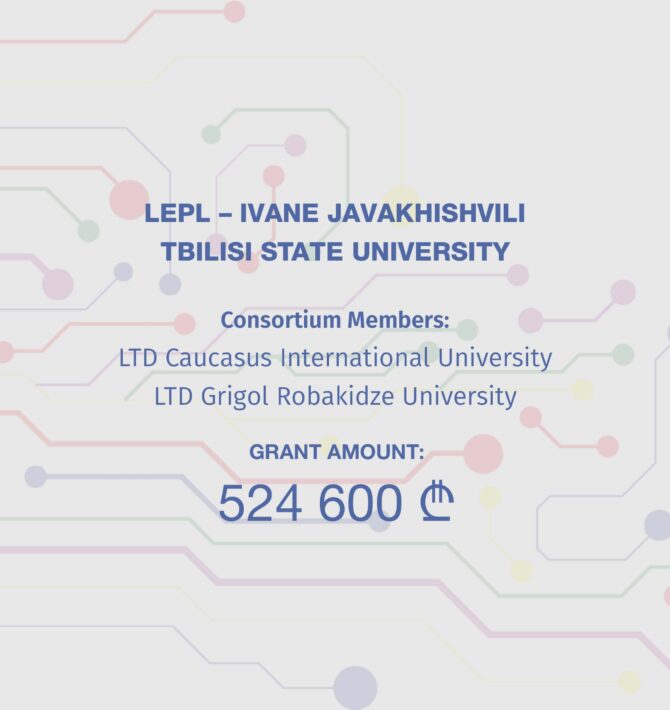Development and Implementation of a Modern Translational Neuroscience Program in Georgian Universities for the Improvement of Higher Medical Education
Beneficiaries: Ivane Javakhishvili Tbilisi State University, Caucasus International University and Grigol Robakidze University
Project Name: Development and Implementation of a Modern Translational Neuroscience Program in Georgian Universities for the Improvement of Higher Medical Education
Implementation Date: 08/2023 – 01/2025
Total Project Cost: 682,828.65 GEL
Grant Amount: 524,600.65 GEL
Description
The goal of this project is to develop the teaching of neuroscience in the higher medical schools of Georgia and bring it into line with international standards and the spirit of the Bologna process.
The project covers both the pre-diploma (creation of an integrated translational neuroscience course) and post-diploma (inter-university doctoral program in neuroscience in Georgian and English languages), as well as the professional development (training of neuroscience and clinical neurology lecturers) steps. Within the framework of the project, developing an integrated educational course of basic neuroscience and its teaching methodology, preparing an interuniversity research “hub” of translational neuroscience and a structured doctoral program, as well as, with the initiation of Science Education methodology in clinical neurology is implemented. The proposed innovative neuroscience program will be supported by artificial intelligence (AI)-based virtual patient programs and augmented reality capabilities. By implementing the project, a neuroscience teaching model will be created and introduced in accordance with international standards; besides, the methodological bases of its implementation in other higher medical schools will be provided.
Activities
In collaboration with leading European educational schools and experts, a new integrated educational course of basic and translational neuroscience is created, based on the renewation and modernization of the existing courses. This activity involves adapting similar course models from European universities to the curricula of the consortium’s participating universities. In the wake of the development of the integrated educational course of neuroscience, the training of lecturers/pedagogues (trainers) for the implementation of the course is being carried out.
At the same time, an interuniversity laboratory of translational neuroscience (“Hub”) equipped with modern research and teaching laboratories for joint scientific-educational activities of scientists, resident doctors, and students is being created on the basis of TSU. Also, a scientific work plan of the laboratory and student engagement plan is being developed.
With the participation of the universities included in the consortium the interuniversity structured PhD program “Translational Neuroscience” is being prepared for accreditation, with the support of foreign consultants.
Creation of the computer classes and conducting teaching according to the principles of science education (Education through Research), problem-based learning (PBL), using the virtual patient program and augmented reality approaches in each university (member of the consortium) and/or in the clinics participating in the project (on the clinical bases of the above-mentioned universities) is in progress.
Sustainability
The principal strengths of the presented project lies in its caliber and sustainability, excellent access to infrastructure (environmental) as well as contextual – educational-scientific sustainability:
- The new modernly equipped teaching and research laboratory created on the campus of the Institute of Morphology of TSU, together with the properly equipped building of the vivarium on the same campus and the experimental medical-biological research center of the Faculty of Medicine of TSU ensures the permanent conduct of research in the direction of neuroscience, with high impact research output. Additionally the state of the art computer classrooms will strengthen the teaching/learning with the updated methodology of the updated clinical neurology module, becoming a highly attractive for National and International students and trainees.
- The Integrative Translational Neuroscience curriculum developed within the grant project will be incorporated into the broader context of “Medicine” educational programs (in Georgian and English languages) – first as an elective course, after that as a mandatory course (during the subsequent accreditation of the mentioned programs), which will be implemented by the academic staff trained in frames of the project. After accreditation of the interuniversity doctoral program “Translational Neuroscience” will be permanently announced the admission of doctoral students who will work in neuroscience under the supervision of Georgian and foreign co-supervisors, including in the above-mentioned laboratory.







